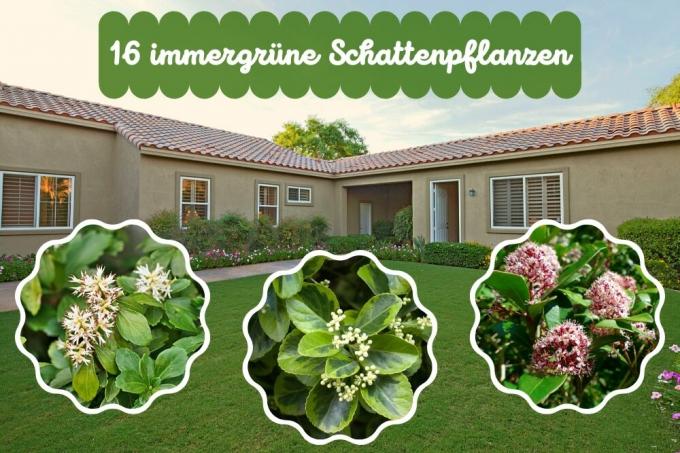
table of contents
- Evergreen shade plants from A to E.
- G to K
- L to S
- Evergreen shade plants with Z
- Frequently asked questions
When it comes to greening the garden or balcony, various aspects must be taken into account. This is especially true when it comes to shady locations. Evergreen plants for the shade are ideal.
In a nutshell
- evergreen shade plants are available in different variations
- not every crop is suitable for cultivation in pots or outdoors
- when choosing, attention should be paid to toxicity
- Easy-care plants for the shade are often also suitable as privacy screens
Evergreen shade plants from A to E.
Boxwood - Buxus sempervirens

The boxwood is easy to care for, easy to cut, robust and evergreen. It can stand alone in a bucket or outdoors, has long since proven itself as a hedge and can be wonderfully shaped. In addition, it also fits well in locations that are in the light of the shade.
However, the clippings must be made frequently and regularly at short intervals. Because the box tree can reach a height of up to six meters and then does not fit on a balcony or in most gardens.
Dickman - Pachysandra terminalis
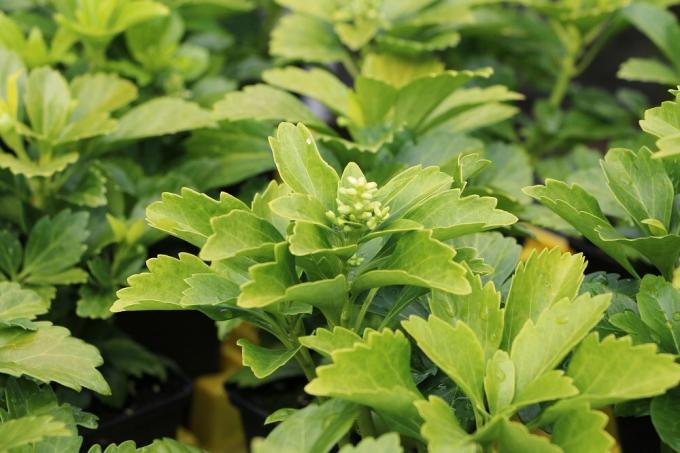
The so-called fat man only reaches a comparatively low height and is therefore wonderfully suitable for container culture and for planting under trees and higher bushes. Its properties are:
- a height of up to 35 centimeters
- evergreen foliage
- preferred locations in light shade or full shade
- blooms between April and May
- white showy flowers and fleshy leaves
Real daphne - Daphne mezereum

The daphne is a low, densely growing shrub that is also wonderfully suitable for cultivation in a bucket. The evergreen plant reaches a maximum height of one meter and can grow in both partial shade and shade. The plant, on the other hand, does not tolerate direct sun.
The daphne blooms between March and May and conjures up splashes of color with its lilac-colored flowers in the garden or on the balcony.
Ivy - Hedera helix

Ivy can also be used as a creeping privacy screen or as a ground cover. With a climbing aid, the ivy can also protect the balcony from prying eyes, and it also grows comparatively fast and proves to be robust and resistant as well as easy to care for. The different types have different properties.
Tip: Overall, however, ivy is also ideal for people without green fingers and experience in plant care.
G to K
Common Oregon grape - Mahonia aquifolium

The evergreen common Oregon grape can be in partial or full shade and has these properties:
- reaches a height of about one meter, therefore suitable for tub culture
- golden-yellow flowers from April to May
- forms purple-black berries between spring and summer
- Fruits are edible, harvest between August and December
- decoratively shaped leaves
Sacred bamboo - Nandina domestica

Strictly speaking, the sacred bamboo is not bamboo, but a type of barberry. As long as the shrub is sheltered from the wind and in the shade, it usually thrives without problems and is easy to care for.
In autumn it enchants with its brightly colored leaves. For a long time, flowers and berries serve as a source of food for insects and birds.
Evergreen honeysuckle - Lonicera henryi

The evergreen honeysuckle is a fast-growing plant that thrives in both sun and shade. If it is placed in a shady location, however, it is easier to care for and the need for water is lower. The evergreen honeysuckle can also be used as a privacy screen through trellises or climbing aids on fences and railings. In addition, the plant offers these properties and benefits:
- can be used as a ground cover or as a climbing plant with a climbing aid
- reaches heights of four to eight meters
- can expand over widths of one and a half to two and a half meters
- good alternative to ivy
- evergreen leaves
- exudes a light fragrance
- Flowers are yellow or red
- Flowering period from June to July
- forms black fruits in the shape of berries
- also well suited for bucket culture
Cherry laurel - Prunus laurocerasus

The cherry laurel offers different varieties and cultivars for different conditions. There are also varieties with leaves that are green all year round. Inflorescences and fruits are extremely decorative. In addition, the plants can reach heights of up to 2.5 meters and are easy to cut.
As a result, the plants provide good privacy, can be cultivated as a hedge, but can also be planted individually.
Creeper - Euonymus fortunei
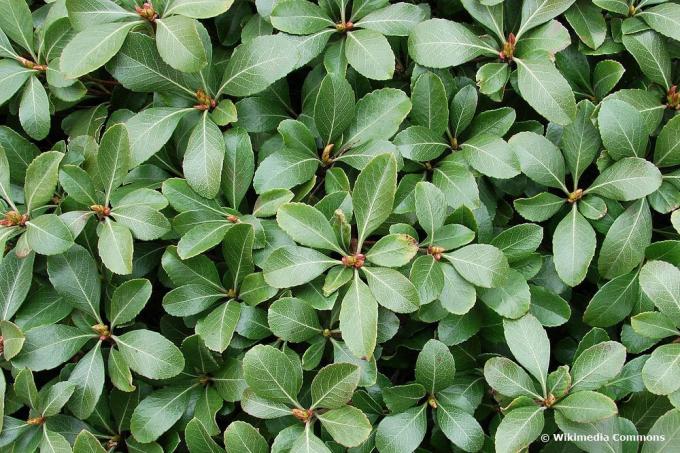
The crawler - known in botanical terminology as Euonymus fortunei - can be used both as a ground cover and as a privacy screen. As a ground cover, it reaches a height of around 20 to 60 centimeters. If a climbing aid or climbing aid is provided, it can reach a height and length of up to ten meters. It also has the following properties:
- Flowering period from June to July
- reddish brown leaves in autumn but no leaves are shed
- ideal for light shade to full shade
- perennial
- decorative green leaves
L to S
Laurel rose - Kalmia
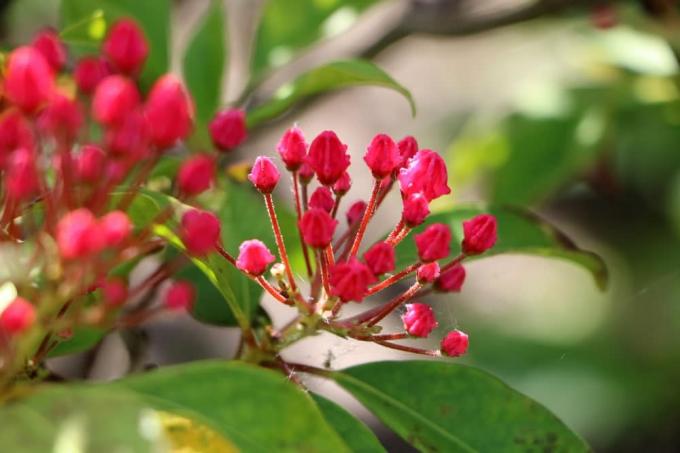
The laurel rose is an evergreen heather plant that is comfortable in shady locations and can be grown both in pots and outdoors. Their properties and peculiarities include:
- can reach a height of up to two meters
- the flower is reminiscent of rhododendrons
- need an acidic substrate
- shiny green leaves
- also suitable for bucket culture
Columnar - Taxus baccata
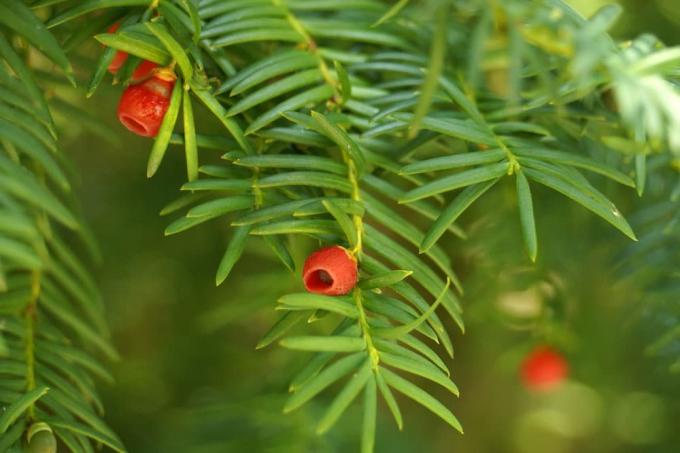
Columns and yews in general are evergreen plants that can sometimes reach impressive heights and widths. However, they can be cut to keep the dimensions compact
- impressive as a solitary wood
- ideal for partially shaded to shady locations
- can reach heights of up to four to seven meters
- inconspicuous flowers
- red berry-like fruits
- needle-shaped, green leaves
Attention: But beware! The columnar was just like other yew variants in all parts highly poisonous. The plant should therefore be avoided in gardens or on terraces and balconies with children and pets. In addition, appropriate protection for the skin must be worn when the column was cut, and the green cuttings must be destroyed or disposed of in the residual waste in order to prevent poisoning.
Snowball - Viburnum opulus

The snowball has eye-catching and very pleasantly fragrant inflorescences. How strong the scent is depends on the variety. Its claims and key factors include:
- evergreen varieties available
- prefers partially shaded location, but also tolerates sun
- reaches heights of growth of one and a half to six meters, depending on the variety
- possible flower colors are white, yellow and pink, depending on the variety or cultivated form
- Flowering time also depends on the variety
If you not only want a suitable variety for the shade, but also want to enjoy fragrant flowers in winter, you should opt for the evergreen winter snowball. They bloom between November and April.
False cypress - Chamaecyparis

False cypress trees are not only a wonderful alternative to cypress trees, as they are suitable for sunny to shady locations. They also have other advantages:
- grows columnar
- reaches a height of up to six meters, but can be cut and kept compact
- no recognizable flower but brownish cones
- very hardy
- as a privacy screen and suitable for bucket culture
- lush green leaves
Skimmia - Skimmia japonica

Skimmias are decorative plants with thick, fleshy, and glossy leaves. They form eye-catching inflorescences and fruit clusters and are lush green. Since they can be left outdoors or in a planter outdoors all year round, they are a good choice for gardens, patios and balconies.
Evergreen shade plants with Z
Zwerghut spruce - Picea glauca 'Conica'

The small spruce or conifer with the botanical name "Conica" is ideal for light shade or partial shade - but can also stand in the blazing sun. The versatile plant is easy to care for and ideal for growing in pots, but should be rotated regularly. Because without turning, the green grows specifically towards the light.
Note: Due to the existing winter hardiness with sufficient protection, the dwarf hat spruce is also suitable for planting outdoors.
Cotoneaster - Cotoneaster

The coton bird is ideal for growing in a bucket or a box on the balcony. The evergreen plant thrives in the sun as well as in the shade. In spring it sets accents with white flowers, which later develop into bright red berries.
Due to the robust nature of the cotoneaster, it can be used in a variety of ways and is easy to care for.
Frequently asked questions
It is often forgotten to provide the plants with sufficient water and fertilizer. But even in full shade, the evergreen plants sometimes have a high consumption. However, care should always be tailored to the type of plant.
With regard to watering and fertilization, the effort for plants in a tub is actually somewhat higher. Especially when they are under one roof. However, it is much easier to overwinter non-winter-hardy plants than outdoors, since the planters can simply be moved to a frost-free location.
Yes. Conifers and conifers in particular are green all year round and in many cases are also hardy in this country. They are also a good choice as privacy screens, as they do not shed the green and usually grow very quickly.



